Why You Still Need a Police Report for Minor Parking Lot Crashes
By PAGE Editor
Parking lot fender-benders happen every day with minor scrapes, slow-speed bumps, and small dents that often seem too trivial to report. Many drivers exchange apologies and drive away, thinking it's not worth the hassle.
Involving the police matters because, without an official report, proving fault becomes difficult, especially if the other party changes their story or the damage turns out to be worse than expected. Insurance companies rely on documentation, and without it, your claim could be denied or delayed.
In some cases, what begins as a minor disagreement can escalate into a serious dispute, one that may require you to hire a car accident attorney to protect your rights. A simple police report at the scene can prevent major headaches down the road, saving you time, money, and unnecessary stress.
Establishing an Official Record
A police report does more than record an event; it creates an official, unbiased snapshot of what happened. When police arrive at a parking lot crash, they document key details like the exact time, the specific location, and who was involved. They also gather contact information for all parties and any witnesses present.
This neutral account is incredibly valuable because it prevents conflicting stories from appearing later. Without this official record, one party might change their version of events, making it much harder to prove what occurred or fight against false claims.
Insurance Claims Depend on Documentation
Regarding car insurance, a police report is often a critical piece of the claim, even for minor parking lot bumps. Insurance companies frequently require this official documentation to process your claim smoothly. Without a police report, you might find yourself in a tough spot, struggling to prove who was at fault for the damage.
Some insurers might even deny your claim entirely or offer less money for repairs if no formal documentation supports your claim. This report acts as concrete evidence, protecting your financial interests and ensuring you get the compensation you deserve.
Protecting Yourself from Future Liability
Sometimes, what seems like a minor bump can lead to bigger problems later. For instance, injuries like whiplash or back pain might not show up until days after the accident. A police report dated the day the incident happened is crucial because it links those delayed issues directly back to the crash.
Without this official documentation, the other driver could later claim you caused more serious damage or injuries than initially discussed, leaving you vulnerable to unexpected financial responsibility.
When Emotions Cloud Judgment
Right after a bump in a parking lot, people often try to keep things calm. "It's fine," someone says. "No need to get the police involved." We agree, thinking it's the easiest way to move on.
But emotions wear off. Later, the other driver might see more damage or remember things differently. Without a report, there's nothing solid to rely on. A police report keeps things based on facts, not feelings, and helps avoid those surprise claims.
Parking Lots Are Not Private Enough to Skip Protocol
Many people mistakenly believe that parking lots, being "private property," are exempt from traffic laws, but that's not the case. Police can and do respond to accidents in parking lots, and the rules of the road still apply. In some states, leaving the scene without reporting the incident could even be classified as a hit-and-run. Whether the crash happens on public roads or private property, having a proper paper trail is essential.
HOW DO YOU FEEL ABOUT FASHION?
COMMENT OR TAKE OUR PAGE READER SURVEY
Featured







Rich people need love too, but their busy schedules often make it challenging to find an ideal date in real life.